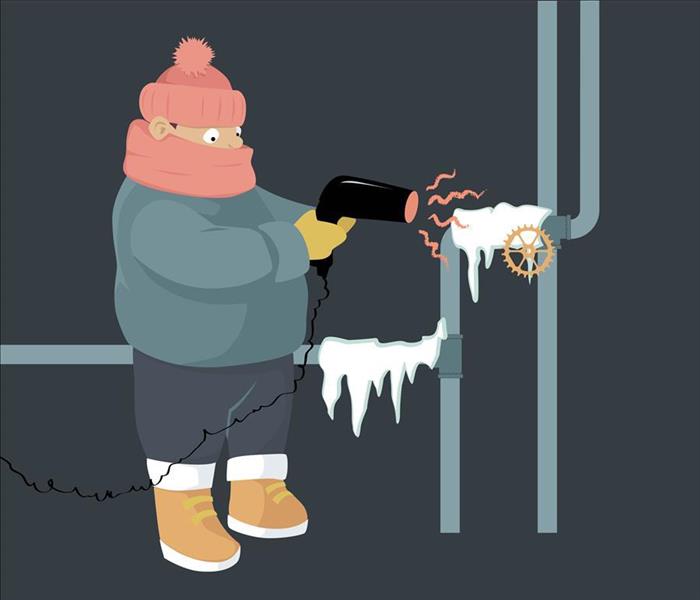Essential Tips to Protect Your Home in Colorado Springs
12/26/2023 (Permalink)
As winter blankets the picturesque city of Colorado Springs with a snowy embrace, homeowners need to prepare for the challenges that come with freezing temperatures. One of the most vulnerable aspects of your home during winter is its plumbing system. Frozen pipes can lead to costly repairs and significant inconvenience. In this blog, we'll explore essential tips to protect residential pipes from freezing during the winter season in Colorado Springs.
Tips To Protect Pipes From Freezing
Understanding the Risks:
Colorado Springs is known for its cold winters, and temperatures often plummet below freezing. When water in pipes freezes, it expands, creating pressure that can cause pipes to burst. This can lead to water damage, costly repairs, and the inconvenience of being without water during freezing temperatures. Understanding these risks is the first step in proactively protecting your home's plumbing.
- Insulate Exposed Pipes:
One of the most effective ways to prevent pipes from freezing is to insulate them. Identify exposed pipes, especially those in unheated areas like basements, crawl spaces, and attics. Insulating these pipes with foam or fiberglass sleeves provides a barrier against the cold, reducing the risk of freezing. Pay special attention to pipes near exterior walls and windows, as they are more susceptible to the cold.
- Seal Drafts and Air Leaks:
Cold drafts can contribute significantly to freezing pipes. Conduct a thorough inspection of your home for drafts and air leaks, paying attention to areas around windows, doors, and any openings in the walls. Seal these gaps with weather stripping or caulk to keep cold air out and maintain a warmer environment around your pipes.
- Maintain Consistent Indoor Temperatures:
Keeping your home consistently heated is crucial in preventing pipes from freezing. Set your thermostat to a temperature that ensures a warm environment throughout the day and night, even when you are away. While it may be tempting to lower the thermostat to save on energy costs, the potential expenses and inconveniences caused by frozen pipes outweigh the short-term savings.
- Allow Faucets to Drip:
In extremely cold weather, allowing faucets to drip slowly can help prevent pipes from freezing. The continuous flow of water, even at a minimal rate, reduces the likelihood of water freezing within the pipes. Focus on faucets connected to exterior walls and those located in unheated areas. While this method may increase water usage slightly, the cost is minimal compared to the potential expenses associated with frozen pipes.
- Disconnect and Drain Outdoor Hoses:
Don't forget about your outdoor plumbing components. Disconnect and drain hoses, and shut off the water supply to outdoor faucets. Leaving water in outdoor hoses and pipes can lead to freezing, expanding, and potentially causing damage. Storing hoses indoors during the winter is also a good practice.
- Install Pipe Heating Cable:
For particularly vulnerable areas or pipes that are more prone to freezing, consider installing pipe heating cable. This electrical heating element wraps around pipes, providing consistent warmth to prevent freezing. Pipe heating cable is a cost-effective solution for added protection in areas where insulation alone may not be sufficient.
- Insulate the Water Heater:
Insulating your water heater can also contribute to energy efficiency and help maintain warmer water temperatures. A water heater blanket, made of fiberglass or other insulating materials, can be wrapped around the water heater to reduce heat loss. This ensures that your water heater doesn't have to work as hard to maintain a desired temperature, ultimately saving energy and reducing the risk of frozen pipes.
- Be Prepared for Extended Absences:
If you plan to be away from your home during the winter months, take extra precautions to protect your pipes. Set the thermostat to a temperature that will prevent freezing, even in your absence. Ask a neighbor or a friend to check on your home periodically and address any issues that may arise. Consider shutting off the main water supply and draining the pipes if you'll be away for an extended period.
As winter settles in Colorado Springs, CO, safeguarding your residential pipes from freezing is a proactive measure that can save you from costly repairs and the inconvenience of water damage. By insulating pipes, sealing drafts, maintaining consistent indoor temperatures, and implementing other preventive measures, you can enjoy a cozy winter without worrying about the potential hazards of frozen pipes. Taking these steps will not only protect your home but also ensure that you and your family stay warm and comfortable throughout the winter season.



 24/7 Emergency Service
24/7 Emergency Service
